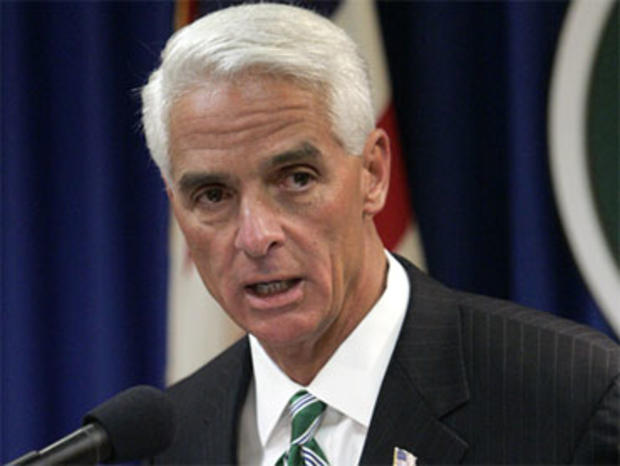Charlie Crist: How Would He Do as an Independent?
Florida's Republican Governor Charlie Crist has thus far said he's not running as an independent for the U.S. Senate (and thus not ceding the GOP nod to challenger Marco Rubio.) But that hasn't stopped widespread speculation that he still might. What kind of electorate would Crist be up against if he does? Some polls and past contests offer clues.
A recent poll suggests Crist does have some of the crossover appeal he'd need with Republicans and Democrats, at least now. A Quinnipiac poll last week tested Crist as an independent vs. Rubio as the Republican and Democrat Kendrick Meek and showed Crist at 32 percent, Rubio at 30 percent and Meek at 24 percent.
The poll shows Crist getting a sizeable 27% of Democrats and 30% of self-identified Republicans in building that lead.
The Quinnipiac poll showed Crist still has mostly favorable ratings from Floridians. Crist's name recognition, as the sitting governor, of course means that he doesn't have to spend money - which wouldn't be coming from the party, obviously - and time introducing himself to voters, and that takes away one hurdle many independent or third-party candidates often face. (A good example of this phenomenon is Joe Lieberman, who won in Connecticut.)
It's worth noting, though, that sizeable percentages in that poll said they still needed to learn more about both Rubio and Meek. However, those who do know them are favorable, so it appears both of them do have potential to grow from here and it re-emphasizes how long the timeframe is between now and primary day (in August) as well as the general election.
We can also look at some past Florida races for a guide to what vote targets Crist might be up against come the fall, considering he will be running without the benefit of the kind of partisan loyalty at the ballot box that party nominees usually get.
In three-way races a winner doesn't always reach the 50 percent mark, so that probably lowers everyone's vote target. Crist would be competing against the Republican and Democratic "baseline" votes - those committed partisans who'll mostly back their party's official nominee, whoever it is. Vote totals in losing races can help indicate around where that line is. Republicans lost a recent lopsided Senate contest (2006) with 38 percent of the vote, which gives some clue. The state partisan registration in the state is 36 percent Republican.
The state currently has 42 percent registered Democrats. Democrats' managed 45 percent in losing the 2006 governor's race (to Crist) and 43 percent in losing a down-ballot race for Agriculture Commissioner, and also 43 percent against Jeb Bush in 2002.
Note, though, that Crist has gotten some Democratic votes on Election Day before; in that 2006 race exit polls showed he won 14 percent of them. Exit polls showed Crist split the independent vote, split moderates, and took two in ten liberals.
Charlie Crist Pulls TV Ads, Increasing Speculation About Campaign's Future
Will Charlie Crist Run as an Independent?
Anthony Salvanto is CBS News Elections Director. You can read more of posts in Hotsheet here.

